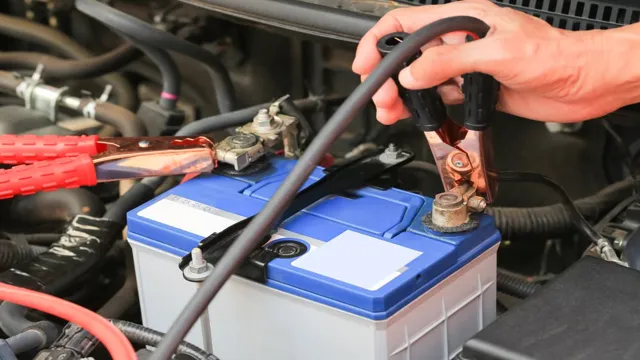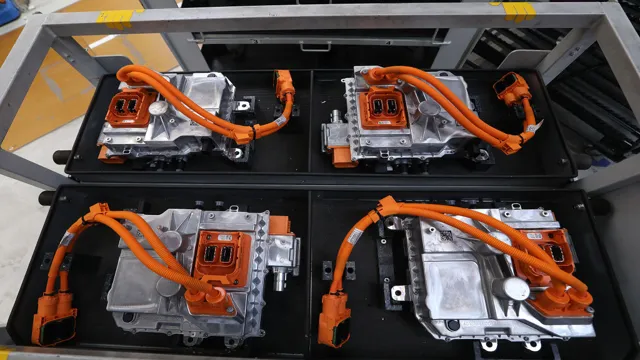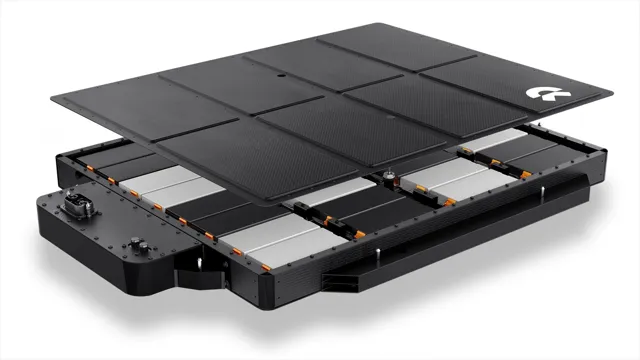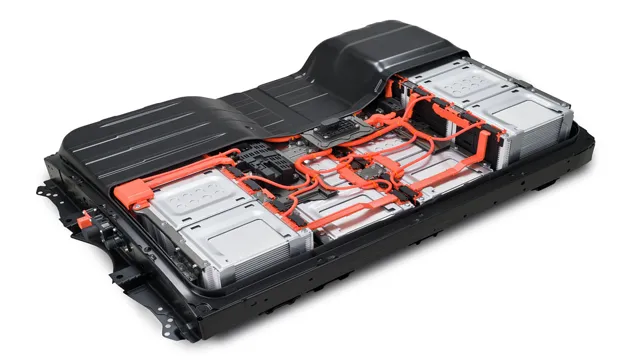Revolutionizing the Road: Charging Your Electric Car with the Power of Batteries
Electric cars are becoming increasingly popular among environmentally conscious drivers. Not only do they look sleek and futuristic, but they also significantly reduce carbon emissions. However, one common concern that many potential electric car owners have is regarding the battery life and charging process.
How do you charge an electric car battery? Where can you find charging stations? How long does it take to charge? These are all valid questions, and this blog is here to help answer them and put your worries at ease. So sit back, relax, and let’s dive into the world of charging your electric car battery.
Types of Electric Car Batteries
If you’re looking to charge your electric car with a battery, it’s important to understand the different types of batteries available. Lithium-ion batteries are the most common type used in electric cars, thanks to their high energy density, lightweight design, and long lifespan. However, there are also other types of batteries, such as nickel-metal hydride (NiMH) and solid-state batteries, that are being developed for use in electric cars.
Each type of battery has its own unique advantages and disadvantages, so it’s important to consider factors such as price, charging time, range, and durability when choosing which type of battery to use for your electric car. Regardless of the type of battery you choose, it’s crucial to follow proper charging protocols to ensure that your battery lasts as long as possible and provides optimal performance for years to come.
Lithium-ion Batteries
Lithium-ion batteries are the most commonly used type of battery in electric cars. These batteries are known for their high energy density, which allows them to store more energy in a smaller space than other types of batteries. Lithium-ion batteries come in various sizes, and the specific type used in an electric car will depend on factors such as the car’s range, power output, and price point.
Some popular types of lithium-ion batteries used in electric cars include nickel-manganese-cobalt (NMC), nickel-cobalt-aluminum (NCA), and lithium-iron-phosphate (LFP) batteries. Each type has its advantages and disadvantages, such as NMC batteries having a higher energy density but a shorter lifespan compared to LFP batteries. When considering an electric car, it’s essential to understand the battery type and its specifications to make an informed decision.
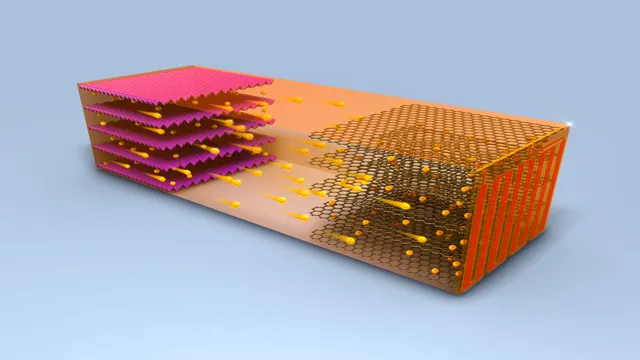
Nickel-Metal Hydride Batteries
Nickel-metal hydride (NiMH) batteries are a popular type of battery used in electric cars, along with lithium-ion and lead-acid batteries. These batteries use a combination of nickel oxyhydroxide positive electrodes and hydrogen-absorbing negative electrodes to store energy. One of the advantages of NiMH batteries is that they have a longer lifespan than lead-acid batteries, and they are also more energy-efficient.
However, they are not as efficient as lithium-ion batteries, which are rapidly becoming the standard for electric cars. Despite this, NiMH batteries are still used in some hybrid vehicles due to their reliability and affordability. As the electric car industry continues to grow and evolve, it will be interesting to see how NiMH batteries continue to fit into the overall picture of sustainable transportation.
Charging Methods
If you’re wondering how to charge your electric car with a battery, there are a few different methods to choose from. The most common method is to use a home charging station, which typically takes between four and eight hours to fully charge your vehicle. You can also use a public charging station, which can be found at shopping malls, parking garages, and other public places.
These stations typically use fast charging technology, which can charge your car in as little as 30 minutes. Finally, you can also charge your car using a portable charging cable, which can be plugged into any standard outlet. While this method is not as fast as a home or public charging station, it can still be a great option for charging your vehicle when you’re on the go.
Overall, when it comes to charging your electric car with a battery, there are plenty of easy and convenient options available to help keep your vehicle fully charged and ready to go at all times.
Level 1 Charging
Level 1 Charging Level 1 charging is the most basic way to charge an electric vehicle (EV), using a standard 120-volt household outlet. This method of charging is also the slowest, providing an average of 4-5 miles of range per hour of charging. While it is not the most efficient method, it is widely available and requires no special equipment, making it a convenient option for those without access to Level 2 or DC fast charging stations.
Level 1 charging can be used overnight to fully charge an EV and is ideal for those with shorter commutes or who do not need a full charge immediately. However, it is important to note that Level 1 charging may not be sufficient for those with longer commutes or who require more frequent charging. Overall, while Level 1 charging may not be the fastest or most efficient way to charge an EV, it is a practical and accessible option for many drivers.
Level 2 Charging
When it comes to electric vehicle (EV) charging, there are two main methods: level 1 charging and level 2 charging. While level 1 charging can be done using a standard 120-volt household outlet, level 2 charging requires a specific charging station that uses a 240-volt circuit. Level 2 charging is much faster than level 1, as it can add about 25 miles of range per hour of charging, compared to level 1’s 4-5 miles per hour.
This makes it an excellent option for EV owners who need to quickly top up their battery. Installing a level 2 charging station at home can be costly, but it is often worth the investment for the convenience and time savings it provides. Plus, as more businesses and public places install level 2 charging stations, it is becoming easier to find a place to charge on the go.
Whether you’re a daily commuter or a road-tripper, level 2 charging can help ensure that you keep your EV powered up and ready to go whenever you need it.
DC Fast Charging
DC fast charging is one of the most popular charging methods for electric vehicles. This method utilizes direct current (DC) power to charge the vehicle’s battery, which allows for faster charging times compared to alternative methods such as Level 1 or Level 2 charging. DC fast charging stations are typically found along major highways and in urban areas, making long-distance travel and errands more convenient for EV owners.
The process of DC fast charging involves converting AC power to DC power, allowing for a higher current to flow directly into the vehicle’s battery. This method can charge an EV to 80% capacity in as little as 30 minutes, depending on the make and model of the vehicle. However, it is important to note that frequent use of DC fast charging can result in reduced battery life over time, so it is recommended to utilize this method sparingly and when necessary.
Factors Affecting Charging Time
When it comes to charging an electric car with a battery, there are several factors that can affect the charging time. Firstly, the capacity of the battery itself plays a significant role. The larger the battery, the longer it will take to charge.
Secondly, the charging rate of the charging station is important. Higher charging rates will result in a quicker charging time. Thirdly, the amount of charge left in the battery before plugging it in will also have an impact.
If the battery is completely depleted, it will take significantly longer to charge than if it was only partially depleted. However, it’s worth noting that some electric cars are designed to charge faster towards the beginning of the charging process and slower towards the end. Lastly, the weather conditions and temperature can also play a role.
Low temperatures can affect the charging speed, and in some cases, may even prevent charging altogether. Ultimately, the charging time of an electric car with a battery will depend on a variety of factors and can vary greatly from one vehicle to another.
Battery Size
When it comes to charging time, one of the most critical factors is the size of your battery. The larger the battery, the longer it will take to charge fully. This is because a bigger battery has a higher capacity to hold energy, and charging it means filling it up with more energy.
It’s important to note that not all batteries are created equal, even if they have the same size. Different types of batteries have different charging requirements, and some may take longer to charge than others. For instance, Lithium-ion batteries commonly found in smartphones and laptops have faster charging times compared to lead-acid batteries frequently used in cars and boats.
So, when considering charging time, it’s important to factor in the size and type of battery you have. Understanding the battery’s charging time will help you plan better to avoid inconveniences when you need the device.
Charging Rate
Charging Rate Factors Affecting Charging Time When it comes to charging rate, there are several factors that can affect the time it takes to charge your device. One of the most significant factors is the capacity of the battery itself. Larger batteries will take longer to charge than smaller batteries, simply due to the amount of energy that needs to be transferred.
Another factor affecting charging time is the type of charger you are using. Different chargers have different output levels, and some are more efficient than others at transferring energy to your device. The condition of your charging cable and port can also play a role, as damaged or dirty ports can slow down charging speed.
And finally, external factors like temperature can impact the charging rate as well. In general, it’s important to take care of your charging equipment and choose the right charger for your device’s needs to ensure the fastest charging times possible.
Conclusion
In conclusion, charging an electric car with a battery is like giving a heart transplant to a vehicle. Just as a heart pumps fresh blood and oxygen to keep the body running, a charged battery delivers the power necessary to keep an electric car on the road. So next time you see an electric car charging station, remember that it’s not just a place to refuel – it’s a life-saving infrastructure for the green future of transportation.
“
FAQs
How long does it take to charge an electric car with a battery?
The time it takes to charge an electric car depends on the size of the battery and the charging station used. Generally, it takes around 4-8 hours for a full charge on a home charging station, while a fast charging station can provide a full charge in as little as 30 minutes.
Can I charge my electric car with a regular household outlet?
Yes, you can charge your electric car with a regular household outlet, but it will be very slow. Most electric car manufacturers recommend using a Level 2 charging station for faster charging.
Are there different types of electric car batteries?
Yes, there are different types of electric car batteries, including lithium-ion, nickel-metal hydride, and lead-acid batteries. Lithium-ion batteries are the most common in modern electric cars due to their higher energy density and longer lifespan.
How much does it cost to charge an electric car with a battery?
The cost of charging an electric car with a battery varies depending on the cost of electricity in your area and the size of the battery. On average, it can cost between $5-$15 for a full charge on a Level 2 charging station, while a fast charging station can cost up to $20 for a full charge.
